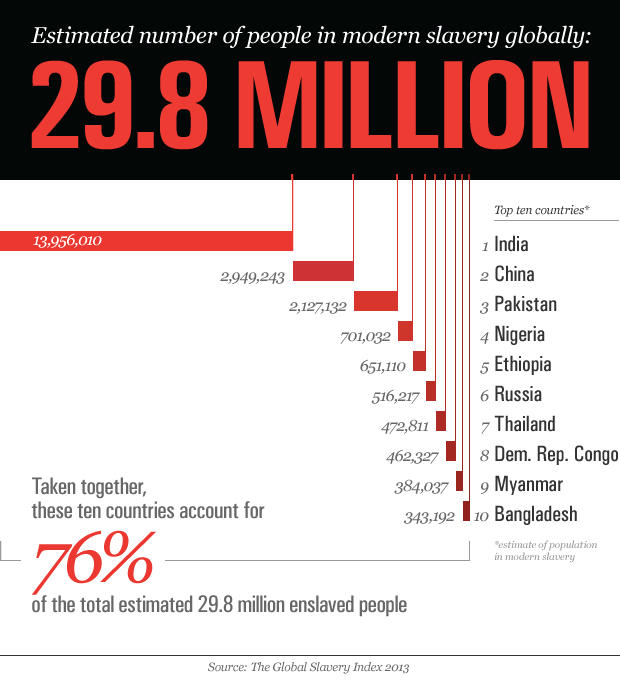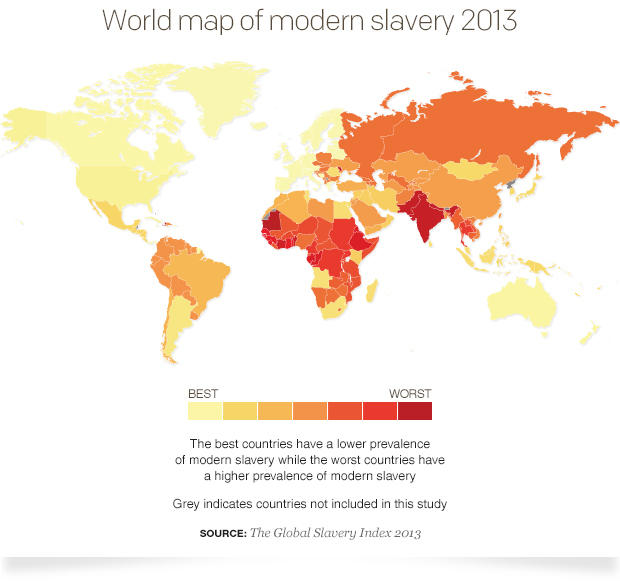Slavery still grips tens of millions worldwide, report says
There are still slaves in the majority of countries across the world, according to a new report released Thursday by the NGO "Walk Free."
The Global Slavery Index 2013, the first major study of its kind, has found there are slaves in 162 countries, including the United States, Canada and Western European nations.
"What slavery is ... what slavery's always been; It's about one person completely under the control of another person, and violence being used to maintain that control and the whole point of that control being exploitation," Kevin Bales, Walk Free index researcher and professor at the Wilberforce Institute for the study of Slavery and Emancipation at the University of Hull, U.K., told CBSNews.com.
"The rule of thumb is that if a person cannot walk away, even into a worse situation, because they literally have no free will and no free movement... those are the criteria that have been used to define slavery all throughout history," explained Bales.
In total, it is estimated that 29.8 million people are enslaved across the world. The highest percentage of slaves is found in South Asia, with India, China and Pakistan having the greatest numbers.
"You go to those countries and it's not so difficult to witness it because there are simply so many people in slavery," said Bales.
"There are plenty of families in South Asia who say, 'Well, you know my family has always belonged to this family.' They don't even have any memory of not being in slavery," added Bales.
Although many believe slavery to be related to human trafficking, Bales said that in the majority of cases, the opposite is actually true.
"Most people in slavery aren't shipped into other countries; they're enslaved in their own countries," he said, "and there, what you can count on is that they're enslaved at the very bottom of the ladder. So it's low-grade agriculture, it's derivative work, like mining, timbering, brick-making. Dirty, dangerous, demeaning kind of work [is] where you're going to find the most."
Although there are no exact figures on how many children are enslaved, according to Bales, many who do find themselves in the dire situation "are enslaved from the moment they can actually begin to do something."
"I've seen kids who are three (years old) in slavery, in quarries ... [in] Pakistan and India. I've seen kids enslaved as servants in West Africa and East Africa, Southeast Asia," he told CBSNews.com before the report was released.
Although the United States, Canada and Western Europe rank very low on the Global Index, they're still home to thousands of slaves.
"It's one of those interesting things where it sounds like good news, and in some ways it is, but it's only good news in the relative sense of it," said Bales.
He believes there's a lack of coordinated enforcement in the majority of developed countries to combat slavery.
"It's not like it's just a hidden crime, it's a hidden response in most Western countries," said Bales.
Products used by Westerners are often touched by slavery.
"Cotton, sugar, coffee, iron, steel, electronic goods, the minerals that go into electronics and so forth, cocoa and lots of commodities, fish, shrimp in particular, they're not 90 percent slave-touched or made, they may only be 2 or 3 or 4 or 5 percent, but we're very poor at finding the parts that are and cutting those out of the supply chain," said Bales.
"When you're drinking your coffee, or eating your chocolate bar, or having some shrimp for lunch, you just don't know, and that's some place we've got to get to," he added.
In spite of the worrying figures, Bales said the world may not far from eradicating slavery altogether.
"The amount that slaves contribute to the global economy and what they put out ... is a minute fraction of the global economy," he said. "We're actually living at a moment where slavery's been pushed right to the edge of its own extinction in terms of economic value to the planet."



